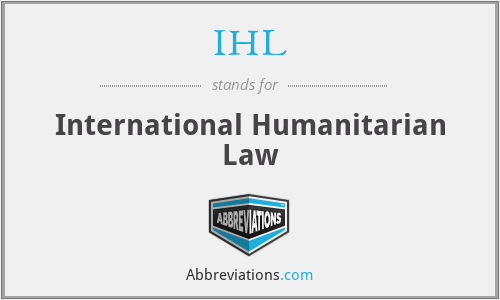What does IHL mean in Law & Legal?
This page is about the meanings of the acronym/abbreviation/shorthand IHL in the Governmental field in general and in the Law & Legal terminology in particular.
Submitted by rinat on December 13, 2006
Translation
Find a translation for International Humanitarian Law in other languages:
Select another language:
- - Select -
- 简体中文 (Chinese - Simplified)
- 繁體中文 (Chinese - Traditional)
- Español (Spanish)
- Esperanto (Esperanto)
- 日本語 (Japanese)
- Português (Portuguese)
- Deutsch (German)
- العربية (Arabic)
- Français (French)
- Русский (Russian)
- ಕನ್ನಡ (Kannada)
- 한국어 (Korean)
- עברית (Hebrew)
- Gaeilge (Irish)
- Українська (Ukrainian)
- اردو (Urdu)
- Magyar (Hungarian)
- मानक हिन्दी (Hindi)
- Indonesia (Indonesian)
- Italiano (Italian)
- தமிழ் (Tamil)
- Türkçe (Turkish)
- తెలుగు (Telugu)
- ภาษาไทย (Thai)
- Tiếng Việt (Vietnamese)
- Čeština (Czech)
- Polski (Polish)
- Bahasa Indonesia (Indonesian)
- Românește (Romanian)
- Nederlands (Dutch)
- Ελληνικά (Greek)
- Latinum (Latin)
- Svenska (Swedish)
- Dansk (Danish)
- Suomi (Finnish)
- فارسی (Persian)
- ייִדיש (Yiddish)
- հայերեն (Armenian)
- Norsk (Norwegian)
- English (English)
Definition
What does IHL mean?
- International humanitarian law
- International humanitarian law (IHL), also referred to as the laws of armed conflict, is the law that regulates the conduct of war (jus in bello). It is a branch of international law which seeks to limit the effects of armed conflict by protecting persons who are not participating in hostilities, and by restricting and regulating the means and methods of warfare available to combatants. International humanitarian law is inspired by considerations of humanity and the mitigation of human suffering. It comprises a set of rules, established by treaty or custom, that seeks to protect persons and property/objects that are, or may be, affected by armed conflict and limits the rights of parties to a conflict to use methods and means of warfare of their choice. Sources of international law include international agreements (the Geneva Conventions), customary international law, general principles of nations, and case law. It defines the conduct and responsibilities of belligerent nations, neutral nations, and individuals engaged in warfare, in relation to each other and to protected persons, usually meaning non-combatants. It is designed to balance humanitarian concerns and military necessity, and subjects warfare to the rule of law by limiting its destructive effect and mitigating human suffering.Serious violations of international humanitarian law are called war crimes. International humanitarian law, jus in bello, regulates the conduct of forces when engaged in war or armed conflict. It is distinct from jus ad bellum which regulates the conduct of engaging in war or armed conflict and includes crimes against peace and of war of aggression. Together the jus in bello and jus ad bellum comprise the two strands of the laws of war governing all aspects of international armed conflicts. The law is mandatory for nations bound by the appropriate treaties. There are also other customary unwritten rules of war, many of which were explored at the Nuremberg War Trials. By extension, they also define both the permissive rights of these powers as well as prohibitions on their conduct when dealing with irregular forces and non-signatories. International humanitarian law operates on a strict division between rules applicable in international armed conflict and internal armed conflict. This dichotomy is widely criticized. The relationship between international human rights law and international humanitarian law is disputed among international law scholars. This discussion forms part of a larger discussion on fragmentation of international law. While pluralist scholars conceive international human rights law as being distinct from international humanitarian law, proponents of the constitutionalist approach regard the latter as a subset of the former. In a nutshell, those who favor separate, self-contained regimes emphasize the differences in applicability; international humanitarian law applies only during armed conflict. On the other hand, a more systemic perspective explains that international humanitarian law represents a function of international human rights law; it includes general norms that apply to everyone at all time as well as specialized norms which apply to certain situations such as armed conflict and military occupation (i.e., IHL) or to certain groups of people including refugees (e.g., the 1951 Refugee Convention), children (the 1989 Convention on the Rights of the Child), and prisoners of war (the 1949 Third Geneva Convention).
Popularity rank by frequency of use
How popular is IHL among other acronyms?
IHL#1#6018#12977
Embed
Citation
Use the citation below to add this abbreviation to your bibliography:
Style:MLAChicagoAPA
"IHL." Abbreviations.com. STANDS4 LLC, 2024. Web. 26 Apr. 2024. <https://www.abbreviations.com/term/498471>.



Discuss this IHL abbreviation with the community:
Report Comment
We're doing our best to make sure our content is useful, accurate and safe.
If by any chance you spot an inappropriate comment while navigating through our website please use this form to let us know, and we'll take care of it shortly.
Attachment
You need to be logged in to favorite.
Log In